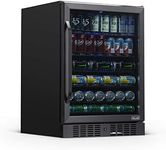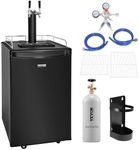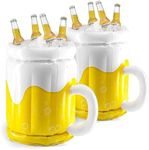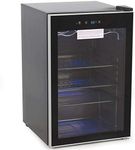Buying Guide for the Best Beer Fridges
Choosing the right beer fridge can make a big difference in how you enjoy your beverages at home, in your office, or even in your garage. The best beer fridge for you will depend on where you plan to use it, how much space you have, and how many drinks you want to store. It's important to think about your drinking habits, the types of drinks you like, and how often you entertain guests. By understanding the key features and specifications, you can find a fridge that keeps your drinks cold, fits your space, and matches your lifestyle.CapacityCapacity refers to how many cans or bottles the fridge can hold at once. This is important because it determines how much you can store and how often you'll need to restock. Beer fridges come in a range of sizes, from compact models that hold a dozen cans to larger ones that can store over a hundred. If you only drink occasionally or have limited space, a smaller fridge might be best. If you often host parties or want to store a variety of drinks, a larger capacity will be more convenient.
Temperature RangeThe temperature range tells you how cold the fridge can get. This matters because different drinks taste best at different temperatures, and some people like their beer extra cold. Some fridges only cool to a certain point, while others can get much colder. If you prefer your beer icy or want to store other beverages like sodas or even wine, look for a fridge with a wider temperature range. Think about your preferences and check that the fridge can reach the temperatures you like.
Size and DimensionsSize and dimensions refer to the physical measurements of the fridge. This is crucial because you need to make sure the fridge fits in your chosen spot, whether that's under a counter, in a corner, or on a countertop. Beer fridges come in compact, mid-size, and full-size options. Measure your available space before shopping and compare it to the fridge's dimensions to ensure a good fit. Also, consider the door swing and whether you need a reversible door for tight spaces.
Shelving and Storage OptionsShelving and storage options describe how the inside of the fridge is organized. Adjustable or removable shelves let you fit different sizes of cans and bottles, which is helpful if you like a mix of drinks. Some fridges have special racks for bottles or extra space for snacks. If you want flexibility or plan to store more than just beer, look for a fridge with customizable shelving. Think about what you usually drink and choose a layout that matches your needs.
Noise LevelNoise level is about how much sound the fridge makes while running. This is important if you plan to keep the fridge in a quiet area like a bedroom, office, or living room. Some fridges are very quiet, while others can be a bit noisy. If noise is a concern for you, look for models that are described as 'quiet' or have a low decibel rating. Consider where you'll place the fridge and how much background noise you can tolerate.
Energy EfficiencyEnergy efficiency tells you how much electricity the fridge uses. This matters for both your utility bills and the environment. Some fridges are designed to use less power, which is better for long-term use. If you plan to run the fridge all the time, look for energy-efficient models or those with an energy-saving mode. Think about how often you'll use the fridge and whether saving energy is a priority for you.
Design and FinishDesign and finish refer to how the fridge looks on the outside. This is important if you care about matching your fridge to your room's style or other appliances. Beer fridges come in different colors and finishes, like stainless steel, black, or glass doors. If appearance matters to you, choose a design that fits your space and personal taste. Consider whether you want a fridge that stands out or blends in with your decor.

















